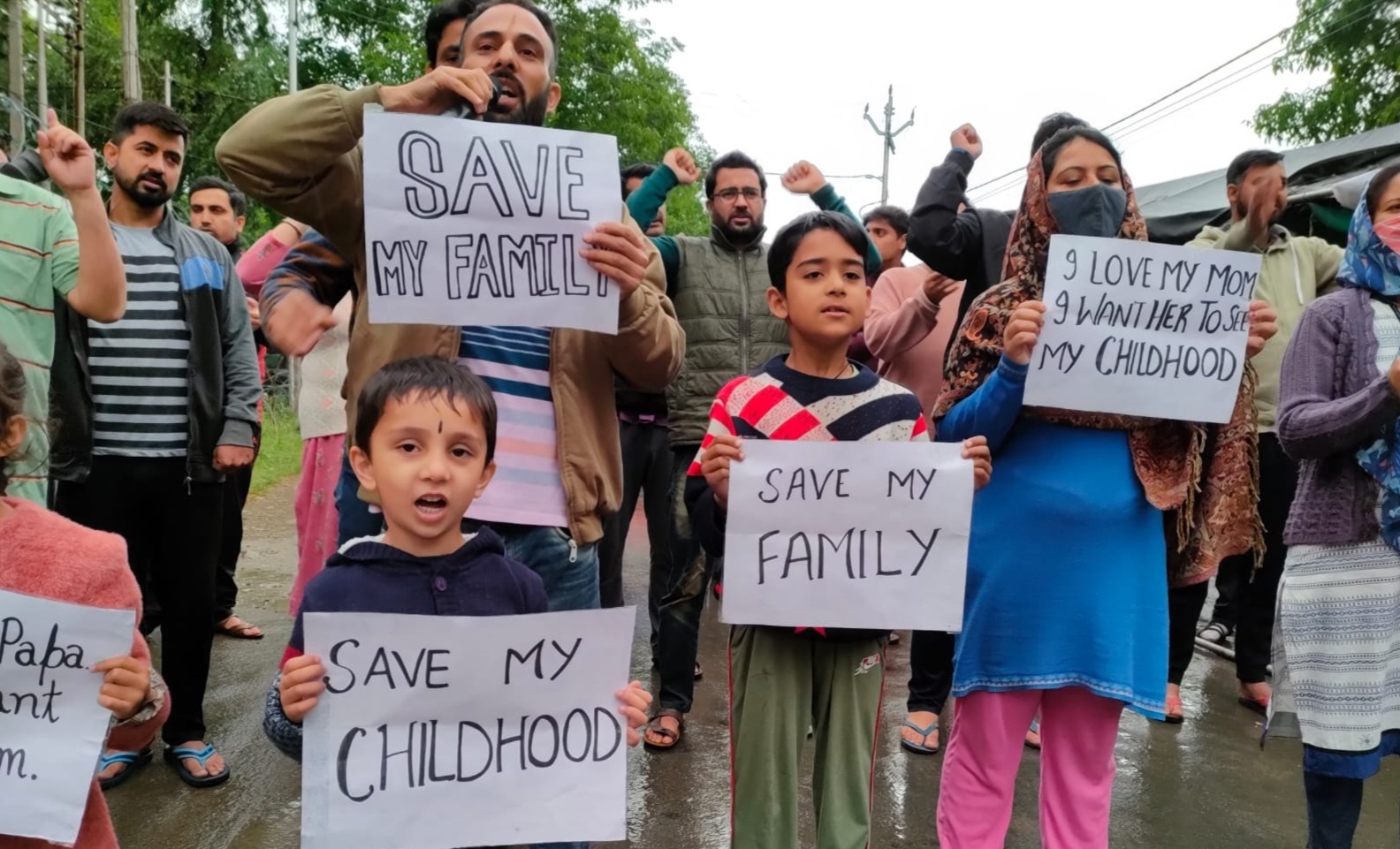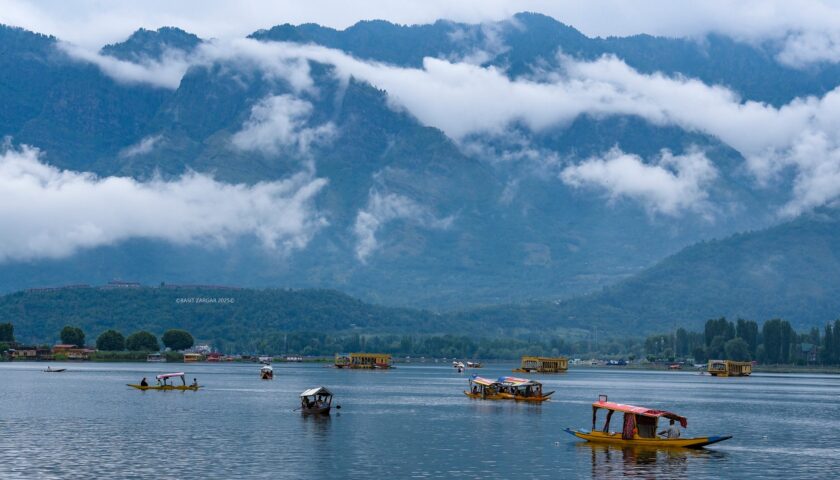By: Lalit Anjum Kher
The Kashmiri Pandits shun being guinea-pigs, and has to realize the underlying schema controlling the govermentality of the establishment. To fight an existential battle for life and honor, the time is ripe to invoke Parashurama within.
Background
In the wake of recent gruesome cold blooded murder of Rahul Bhat, a J&K state government employee working in Kashmir valley has sent shock waves around the nation and the world. He was singled out and subsequently murdered by terrorists in broad daylight inside the Revenue Office, Budgam in Kashmir division. He belonged to Hindu Kashmiri Pandit minority and had often been appreciated by government for his honest public service in recent past. The ghastly killing of Rahul Bhat has added to a continuous trail of targeted murders of Hindu minority in the valley. Rahul Bhat was beneficiary of the Hon. PM Special Employment Package for minority Kashmiri Pandits. This employment scheme was formulated during UPA-II government and implemented by PM Manmohan Singh in 2010. It was introduced supposedly to encourage displaced Kashmiri Pandits, who were victims of genocide to return and rehabilitate back in their ancestral homeland. The youngsters of persecuted Hindu minority Kashmiri Pandits were offered 6000 jobs in Sub-ordinate services in J&K State government. These posts has been created as supernumerary posts in various state departments, without disturbing the exiting cadre strength at district, division and state level so as to satisfy regional skepticism of the people of Jammu and Kashmir division. Further, the budget allocation for this scheme has been borne by Union government under security expenditure head. This employment scheme had inherent defects right from its inception. The flawed design of this scheme rendered the likes of Rahul Bhat as bonded laborers at the mercy of state administration. Several amendments and different clauses were added in this scheme which resulted in salary deductions, non-transfers, stagnation, zero-promotion etc. Thus overall goal of Union government to encourage persecuted minority Kashmiri Pandits to return, rehabilitate and settle in their ancestral homeland took hit and were let down by subsequent J&K state governments which also contributed in systematic intimidation of Kashmiri Pandit youngsters by delaying
the construction of adequate concrete residential quarters. Most of them stayed at rented accommodations and those residing in pre-fabricated transit huts were compelled to live in pathetic conditions. These Kashmiri pandit youngsters were silently putting up with these persistent discriminations for last 12 years. With history of repeated persecutions as a community, KPs has to realize the truth of underlying schema controlling the govermentalityof the establishment.
Legacy and history
With collective history of several millennia, the Kashmir region has boasted of rich culture and traditions dating back to antiquity. The valley of Kashmir is called as Shardha Desh, the abode of Mata Saraswati, who is the Mother Goddess of learning and wisdom. This region is also the cradle of Indic civilization. From the time of yore, this region has been a seat of
higher learning and is regarded as Karma-Bhomi of great philosophical gaints, like Aacharya Abhinavgupta, Panini, Charaka, Kalhana, Aadhi-Shankara, Laleshwari and many others. The legend says that the valley of Kashmir emerged when Maharishi Kashyapa, grandson of Brahma drained waters at Varahmulla, from this primordial lake called Satisar. The archeological evidence of earlier human settlements as pit-dwellers in this land dates back to 3000 BCE. It was discovered at Burzahom site near Srinagar. The historical account of Kashmir presented in continuous chronological sequence has been credited to Pandit Kalhana in form of precious work called Rajatarangani. It highlights the glorious period of Emperor Lalitaditya Muktapida of Karkota suryavanshi dynasty in 8th CE. The valley of Kashmir was dotted with numerous Hindu religious establishments and magnificent temple complexes through its length and breadth. The famous ones being Martand Sun temple in Anantnag, Avantiswami temple in Avantipura, Shankaracharya temple in Srinagar, Mata Ragyna Bagwati Tul Mul in Ganderbal and many more, besides annual Baba Amarnath pilgrimage in Anantnag. Due to relentless destruction at the hands of foreign rulers and non- Hindu extremists in the recent past, many Hindu religious sites are currently in ruins. These Hindu religious sites need resurrection. The Kashmiri Pandits are the inheritors of this glorious legacy. The KP is a forbearer of Indic civilization which connects Bharatvarsh from
Kashmir to Kanyakumari. But as fate has it, these aboriginals had faced seven exoduses in the past seven centuries. According to one historical account Kashmiri Pandit Shri Bhat, healed Shahmiri Sultan Zain-ul-Abidin of his skin ailment when most of his royal court physicians had failed in their attempts. Thereafter the king granted Pandit Shri Bhat a favor to ask, to which Pandit Shri Bhat requested to resettle and rehabilitate his community back in the Kashmir valley. Since then a lot of water has flowed down the river Vitasta aka Jhelum and old kingdoms and fiefdoms have vanished from the face of earth. The community of Kashmiri Pandits has also risen in their respective professions in several places in India and the world. With every passing day this small, peace loving, non-martial community, has often asserted themselves for their rights and aspirations and collectively risen to the occasion for claiming their part of land under sun.
Political assertion of Kashmiri Pandits
It is often discussed with sarcasm amongst political circles that KPs had reached zenith of political power during the premiership of PM Indira Gandhi, who herself belonged to KP community by birth. Several of the top bureaucrats in PMO belonged to KP community, often called Kashmiri Coterie. The grand old political party of India, Indian National Congress in its nascent phase was also supported by Pandit Moti Lal Nehru, a KP settled in Allahabad, UP Despite having hold on such powerful positions, these bureaucrats didn’t do much for the community and KPs on large extent remained in pathetic conditions throughout and faced religious othering in the valley repeatedly. Moreover, there has been a running joke in power corridors that KP is two and half congress, thus mistakenly associating allegiance of Kashmir pandit towards Congress party. However this myth has been shattered, when every KP residing in the country and abroad, supported Bhartiya Janta Party in 2014 and 2019 general elections. Thus proving the point that KP is always a nationalist to the core nothing more nothing less. At the community level, there had been several socio-political reform movements amongst KPs which were led by Kashyap Bandhu aka Tarachand Bhat of Noorpur in recent past. The community adopted Sarees for ladies and encouraged wearing Tilak on forehead and tying of Kalawa on wrist. Various political activities were also organized at Sheetal Nath Temple in Srinagar, where KPs from every nook and corner of
valley participated and were appraised about political developments in valley and around the nation. New breed of KP leadership also emerged gradually. The valley of Kashmir and national mainstream witnessed the political assertion of KPs in 1967 also known widely as Parmeshwari Agitation. Similarly in 1991 Panun Kashmir Movement demanded carving out of separate homeland for Kashmiri Pandits within the valley to safeguard their political and human rights which were consciously being trampled upon from last eight centuries.
Status of Kashmiri Pandits in national mainstream
Right from the medieval times, the KPs had their presence in various royal durbars throughout Indian Sub-continent. It was due to the fact that KP families prioritized the education of their children more than anything else. With cent percent literacy, adaptability, and drive towards learning, often placed KPs at helm of affairs in various royal courts from time to time. Even Mughal durbars employed KPs as Dewans, courtiers etc. It is Mughal Emperor Mohammad Shah Rangeela (1719-49) who issued royal farman recognizing the learned Brahman Bhattas of kashmir as Kashmiri Pandits and this nomenclature got stuck for posterity. There has been an equal contribution of KPs in national politics also. During Independence struggle KPs invested wholeheartedly in Indian National Congress. In later years KPs found resonance with Bharatiya Janta Party. The presence of KPs is also found in other national parties. The nationalistic spirit is imbibed in KP youth and patriotism is inculcated right from the early age which is recognized in the whole nation. The KPs are held in high reverence for their true allegiance to the Bharatvarsh and Indic civilization. However being a miniscule minority community, having meager vote share; KP community is often ignored in electoral politics. As Indian democracy works on numbers, KP community hardly makes any dent in electoral scene in India. Despite this numerical disadvantage, KP community is held in high esteem and issues related to KP community are employed to
mobilize Hindu voters throughout mainland India. The recent release of the Hindi feature film ‘The Kashmir files’ highlighted the gory past of religious persecution of KPs in valley during the eventful years of 1989-90. The whole civilized world has been shaken by the true facts shown in this film. This film resonated with every tormented minority throughout the world, viz Jews, Yazidis, slave Africans and many such communities. Therefore the issue of KP oppression emerged as the fulcrum around which whole nation felt the pain and gathered in solidarity. This episode proved that the KP community has the power to stimulate and awaken the nation from its deep slumber to rise in national interest. This realization has struck the KP community that the emotional connect with Bhartavarsh could be deployed to muster support for resurrection of KPs itself. The nationalistic forces could be ushered towards final and resolute settlement of Kashmir issue with safeguarding the future of KP community in its aboriginal homeland.
Resurgence for justice and rights
The struggle for justice and rights by minority Kashmiri Pandit community has been an ongoing battle for a long time. The persistent endeavors by this community for reclaiming its pride and honor resulted in Margdarshan Resolution by Panun Kashmir Movement in 1991. According to this resolution the carving out of separate homeland in Kashmir valley for aboriginal Pandits is a viable and practical solution. This would be region with UT status where constitution of India will run supreme. Further it will give persecuted KP minority a political agency to assert themselves, which otherwise are rendered powerless, faceless and are ignored due to their limited electoral strength in Indian democratic setup. Empowerment of KPs is necessary. The story of Kashmiri Pandits is same as the story of Indic civilization. Both have suffered adversely at the hands of external forces, foreign invaders which have resulted in continuous persecution and attempts were made to wipe out its aboriginal culture and civilization. Therefore strengthening the Kashmiri Pandits politically will give strength and impetus in safeguarding Indic civilization from future impending threats and challenges in current tumultuous times. To reverse the impacts of genocide of KP community unleashed since seventh century and subsequent seven exoduses from
Kashmir valley, Indian nation state must act in harmony with principles of Bhartiya civilization. The resurrection of Hindu past of Sharda Desh aka Kashmir could unleash the awakening of Sanatanic Dharmic order which has potential to sustain the everlasting peace in the region. The restoration of ancient majestic Hindu temples which were destroyed by foreign invaders could revive the soul of Kashyapa’s Kashmir. The rehabilitation of KPs in their homeland would revitalize the indigenous cultural practices such as Hawan, Yagyna etc which would add significance and heterogeneity to the cultural landscape of present day Kashmir. However many sincere efforts made in this direction were rendered inadequate with fast changing circumstances. The geo-political developments occurring at world stage definitely have an impact on regional socio-cultural environment in the valley.
Unfortunately Kashmiri Pandits are officially recognized by Indian government as Migrants and it does a great disservice to the cause of these genocidal victims who were rendered homeless by religious extremists repeatedly in history. Recently concluded delimitation commission for J&K has allocated two seats for Kashmiri Migrants in J&K assembly on nomination basis. Moreover these two nominated seats in assembly would be open for other Kashmiri migrant communities covering Hindu Rajputs, Sikhs, Gujjars, Bakarwals etc.
Therefore Kashmiri Pandits as aboriginal community of Kashmir won’t gain much by this delimitation exercise by Indian government. Political reservation of KPs is a pre-requisite condition for preserving their human rights.
Ultimate struggle for existence
Resurrection of political assertion by KPs for securing their existence is the result of constant churning happening within the community for long time now. In the search of lost pride, KPs
have been struggling for claiming what rightfully belongs to them. The establishment of peace and order in Kashmir region, which has seen unceasing onslaughts could be possible only if specific political entity is carved out where establishment of Swa-rajya and Su-rajya is accomplished. The formation of Panun Kashmir as homeland for Kashmiri Pandits would be a necessary step in this direction. Panun Kashmir as a political unit would be the only insurance cover for Indic civilization to sustain in current global order which has witnessed centuries of crusades and forceful religious expansionism. Although government of India has undertaken several cosmetic approaches to solve Kashmir issue but to no avail. It has also continued with appeasement policy of Nehruvian socialism but has ultimately failed in achieving any objectives substantially. The government of India has never taken KPs in confidence for solving Kashmir conundrum. It has never recognized KPs as stakeholders in this process. Thus it has tasted defeats repeatedly. Now the time is ripe to take KPs in confidence and give credence to their idea of Panun Kashmir and bring practical changes in body polity of Kashmir valley. This pragmatic approach will have long term positive impacts for Indian nation and Indic civilization as a whole. Further there have also been attempts by vested interests and anti-national forces to obstruct this peace building process for destroying any initiative for strengthening the Indian nation. Regrettably time and again, we
have to face many Jai-Chands within us, whom for their personal agendas has impeded the developmental processes. It is high time to point out that state machinery is working against the civilizational core of this nation. Now Kashmiri Pandits have to stop being scapegoats for machinations of the deep state and must assert themselves to send a message to the establishment, to stop exploiting KP community identity for cheap politics in the Hindi heartland and to cease garnering security budget in the name of securing Kashmiri Pandit lives in Kashmir essentially for lubricating the age old Military-Industrial complex. Therefore in the words of Edward Abbey, an American author activist, “A patriot must always be ready to defend his country against his government”.
Disclaimer: The views and opinions expressed in this article are the personal opinions of the author. The facts, analysis, assumptions and perspective appearing in the article do not reflect the views of Kashmir InFocus. We don’t believe in divide.




